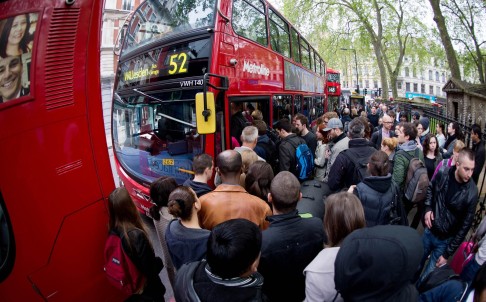London Tube strike causes chaos as commuters scramble for buses, taxis and bicycles
London travellers in rush-hour scramble for buses, taxis and bicycles
PUBLISHED : Tuesday, 29 April, 2014, 10:26pm
UPDATED : Tuesday, 29 April, 2014, 10:26pm
Bloomberg in London

Commuters queue for buses outside Victoria railway station in central London amid the disruption caused by the Tube strike. Photo: AFP
Londoners struggled to get to work yesterday as a 48-hour Tube strike led to cancellations and delays that pushed commuters to compete for bus seats and rental bicycles.
The walkout called by the Rail, Maritime and Transport Workers' union (RMT) over job cuts and ticket office closures began at 9pm on Monday.
It will continue until this evening, with a further 72-hour walkout planned next week.
London Underground kept most lines running with a reduced service and many stations flagged as likely to close were open for travel.
But roads were snarled with traffic and pavements were more crowded as regular Tube travellers made alternative plans.
"The action … is solidly supported," said Mick Cash, the RMT's acting general secretary, adding that the strike would have been suspended had London Underground "responded positively to our proposal to halt the ticket office closures and job cuts". The Tube handles more than three million journeys a day, with 57,000 people using Waterloo station alone in the three-hour morning peak.
The strike comes after the RMT halted the second of two February walkouts following an offer of talks that failed to produce an agreement.
Services were operating on nine of the 11 Underground lines but at a much reduced frequency, causing queues outside stations and overcrowded trains.
More than 50 of the estimated 270 Tube stations were closed altogether, according to Transport for London, which runs public transport in the capital.
Commuters avoiding the subway squashed onto surface trains, which ran as normal, while a record 7,961 buses were operating - 266 more than usual - including 40 of the traditional London Routemasters previously taken out of service.
Many passengers at Heathrow, Europe's busiest airport, avoided the Tube by travelling by black cab, while private taxi operators reported surging business.
Demand for the 10,000 cycles available for hire across the capital rose more than 50 per cent during the February strike and some users struggled to find open docking stations yesterday.
"That's the huge problem," said Thomas Zhu, a financial consultant who switched to pedal power from his usual commute on the Tube's Northern Line.
While Zhu said he was sympathetic towards striking workers seeking to save jobs, London Mayor Boris Johnson called the walkout "pointless" and Prime Minister David Cameron said the disruption was "unacceptable".
No job cuts would be compulsory and wages would not be reduced, said Mike Brown, managing director of London Underground, which reckons staffing reforms are necessary to modernise the system.
"Only the RMT leadership know the real motivations behind their action, but it is infuriating that commuters and businesses are the ones who are being forced to pay the price with five days of disruption," he said.
The strike aims to stop "savage, cash-led attacks on jobs, services and safety," the RMT said.
The union's veteran leader Bob Crow, a self-styled "communist/socialist" who won pay raises even as the government implemented austerity measures, died aged 52 last month.
A new secretary general will be chosen in September, according to spokesman Geoff Martin.
The Tube operated more than one-third of services on February 6, the second day of the last strike, linking 75 per cent of stations. Next week's action is scheduled to start on Monday.
Additional reporting by Agence France-Presse
